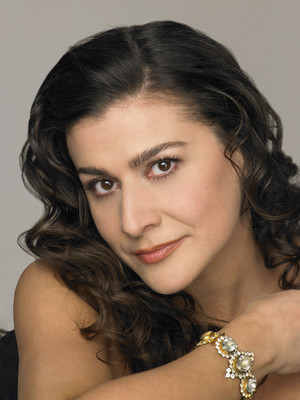| Cecilia BartoliMezzo sopranoFor more than two decades, Cecilia Bartoli has undeniably been
one of the leading artists in the field of classical music. All over the world,
her new operatic roles, her concert programs and recording projects – in
exclusivity with Decca – are expected with great eagerness and curiosity. The
exceptional amount of 8 million CDs sold, more than 100 weeks ranking in the
international pop charts, numerous Golden Discs, four Grammys® (USA), nine Echos
and a Bambi (Germany), two Classical Brit Awards (UK), the Victoire de la
musique (France) and many other prestigious awards reflect the immense success
of for example Opera proibita and her solo albums dedicated to Vivaldi, Gluck
and Salieri and that she is firmly established as today’s “best-selling
classical artist”.
Thus, Cecilia Bartoli brings classical music close to the
hearts of millions of people throughout the world. Apart from that, she is proud
that through their popularity, her projects have caused a wide-spread
re-evaluation and rediscovery of the neglected composers and forgotten
repertoire which she puts up for discussion.
It is not surprising that Herbert von Karajan,
Daniel Barenboim and Nikolaus Harnoncourt were among the first conductors
Cecilia Bartoli worked with. They noticed her talent at a very early stage when
she had barely completed her vocal studies with her parents in her home town
Rome.
Since then, many further conductors, pianists and orchestras
of highest renown have been her regular partners. In recent years, her work has
begun to focus on collaborations with the most significant period instrument
orchestras (Akademie fьr Alte Musik, Les Arts Florissants, Concentus Musicus
Wien, Freiburger Barockorchester, Il Giardino Armonico, Kammerorchester Basel,
Les Musiciens du Louvre, Orchestra of the Age of Enlightenment, Orchestra La
Scintilla). Projects with orchestras where Cecilia Bartoli assumes the overall
artistic responsibility have become increasingly important to her and were
crowned by the jointly developed and performed programmes with the Vienna
Philharmonic Orchestra. For more than two decades, Cecilia Bartoli has undeniably been
one of the leading artists in the field of classical music. All over the world,
her new operatic roles, her concert programs and recording projects – in
exclusivity with Decca – are expected with great eagerness and curiosity. The
exceptional amount of 8 million CDs sold, more than 100 weeks ranking in the
international pop charts, numerous Golden Discs, four Grammys® (USA), nine Echos
and a Bambi (Germany), two Classical Brit Awards (UK), the Victoire de la
musique (France) and many other prestigious awards reflect the immense success
of for example Opera proibita and her solo albums dedicated to Vivaldi, Gluck
and Salieri and that she is firmly established as today’s “best-selling
classical artist”.
Thus, Cecilia Bartoli brings classical music close to the
hearts of millions of people throughout the world. Apart from that, she is proud
that through their popularity, her projects have caused a wide-spread
re-evaluation and rediscovery of the neglected composers and forgotten
repertoire which she puts up for discussion.
It is not surprising that Herbert von Karajan,
Daniel Barenboim and Nikolaus Harnoncourt were among the first conductors
Cecilia Bartoli worked with. They noticed her talent at a very early stage when
she had barely completed her vocal studies with her parents in her home town
Rome.
Since then, many further conductors, pianists and orchestras
of highest renown have been her regular partners. In recent years, her work has
begun to focus on collaborations with the most significant period instrument
orchestras (Akademie fьr Alte Musik, Les Arts Florissants, Concentus Musicus
Wien, Freiburger Barockorchester, Il Giardino Armonico, Kammerorchester Basel,
Les Musiciens du Louvre, Orchestra of the Age of Enlightenment, Orchestra La
Scintilla). Projects with orchestras where Cecilia Bartoli assumes the overall
artistic responsibility have become increasingly important to her and were
crowned by the jointly developed and performed programmes with the Vienna
Philharmonic Orchestra. | |
 Mariinsky Theatre:
Mariinsky Theatre:  Mariinsky-2 (New Theatre):
Mariinsky-2 (New Theatre):  Mariinsky Concert Hall:
Mariinsky Concert Hall: 

